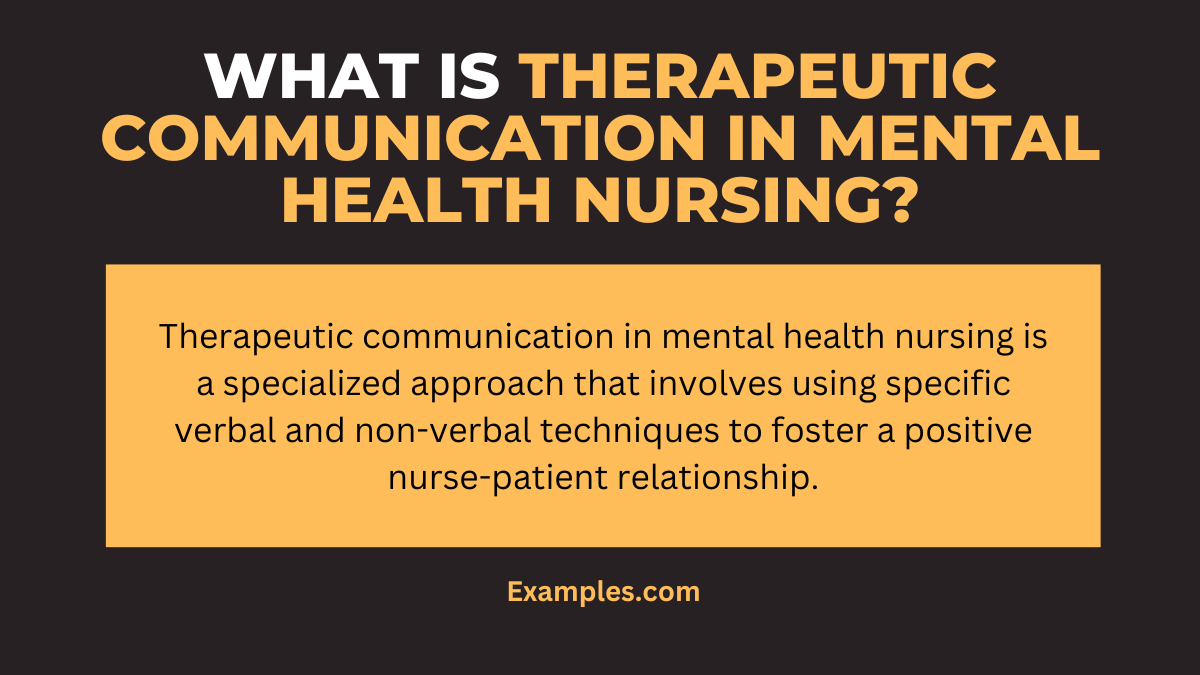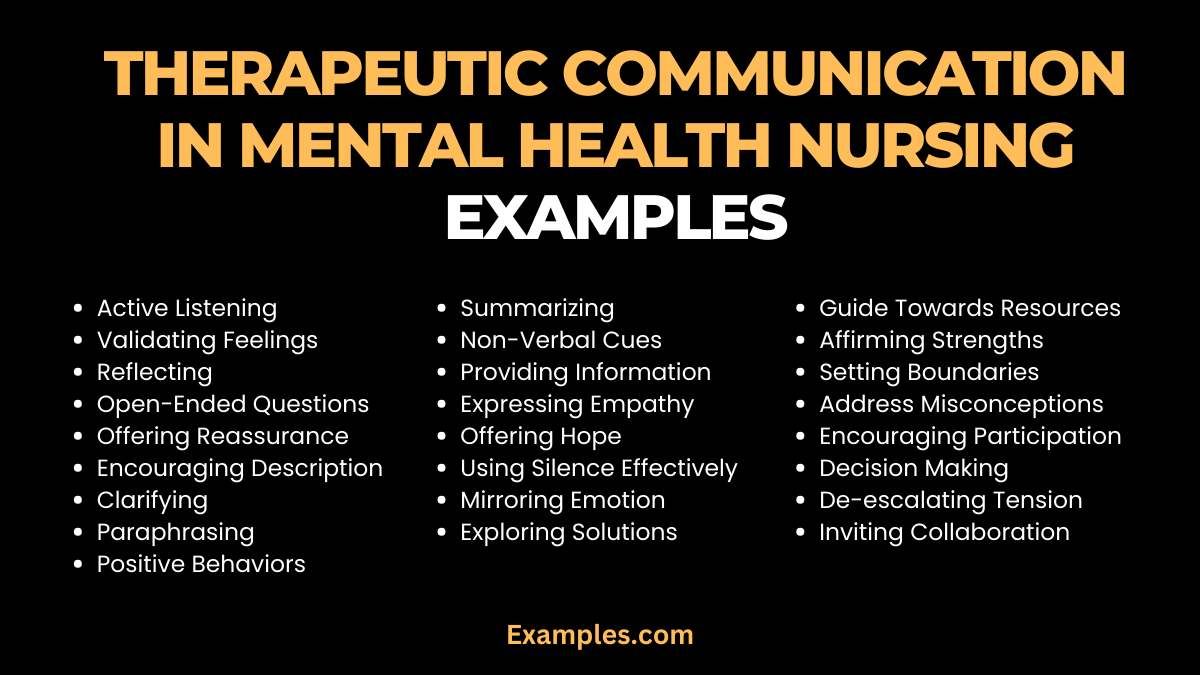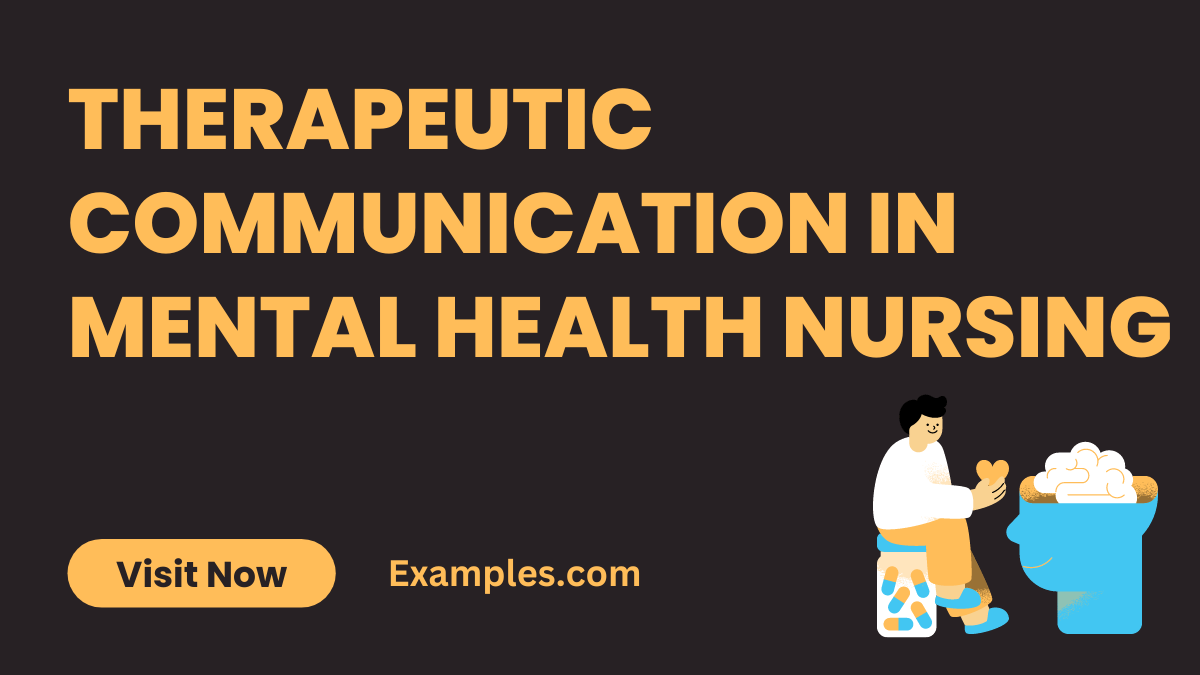24+ Therapeutic Communication in Mental Health Nursing Examples
Therapeutic communication in mental health nursing is a cornerstone for effective patient care. This guide offers insights into various communication strategies, tailored specifically for mental health settings. It includes practical communication examples demonstrating how nurses can establish trust, understand patient needs, and foster a healing environment. By mastering these techniques, nurses can enhance patient engagement and support mental health recovery. This guide is enriched with examples and best practices, making it a valuable resource for those seeking to improve their therapeutic communication skills in mental health nursing.
What is Therapeutic Communication in Mental Health Nursing?

Therapeutic communication in mental health nursing is a specialized approach that involves using specific verbal and non-verbal techniques to foster a positive nurse-patient relationship. This type of communication is tailored to meet the unique psychological, emotional, and psychiatric needs of individuals receiving mental health care. It emphasizes on active listening, empathy, and respectful dialogue, enabling nurses to understand and effectively respond to patients’ concerns. This approach is crucial in mental health settings as it helps in building trust, reduces anxiety, and facilitates the healing process.
25 Therapeutic Communication in Mental Health Nursing Examples

Therapeutic communication is a cornerstone in mental health nursing, fostering a healing environment for patients. It involves empathetic, clear, and respectful interactions, crucial for understanding and supporting mental health recovery. Here are 30 examples, each with a brief explanation:
- Active Listening: Nurse nods and maintains eye contact, saying, “I hear your concern about the medication side effects.”
- Validating Feelings: “It’s understandable to feel anxious about this change.”
- Reflecting: “You seem worried about going home.”
- Open-Ended Questions: “Can you tell me more about your experience with anxiety?”
- Offering Reassurance: “We’re here to support you through this process.”
- Encouraging Description: “How did that make you feel?”
- Clarifying: “Could you explain what you mean by ‘overwhelmed’?”
- Paraphrasing: “So, you’re feeling stressed because of your workload?”
- Summarizing: “You’ve shared that the new environment is making you anxious.”
- Non-Verbal Cues: Smiling gently to convey warmth and understanding.
- Providing Information: “This therapy has been effective for many with similar symptoms.”
- Expressing Empathy: “It must be tough to deal with such intense emotions.”
- Offering Hope: “Many people have overcome similar challenges.”
- Using Silence Effectively: Giving the patient time to process and respond.
- Mirroring Emotion: Reflecting the patient’s tone in a supportive way.
- Exploring Solutions: “What strategies have helped you in the past?”
- Guiding Towards Resources: “Have you considered joining a support group?”
- Affirming Strengths: “Your resilience in this situation is admirable.”
- Setting Boundaries: “Let’s focus on your coping strategies right now.”
- Addressing Misconceptions: “It’s a common myth that…”
- Encouraging Participation: “What are your thoughts on this treatment plan?”
- Facilitating Decision Making: “Which option feels right for you?”
- De-escalating Tension: “I understand this is frustrating; let’s try to find a solution.”
- Inviting Collaboration: “How can we work together on this?”
- Reinforcing Positive Behaviors: “Your effort in therapy is really showing.”
Why is Therapeutic Communication Important in Mental Health Nursing?
Therapeutic communication is vital in mental health nursing because it directly impacts a patient’s treatment and recovery process. Effective communication can help in alleviating symptoms of mental illness, such as anxiety and depression, and plays a key role in establishing a therapeutic relationship. It allows nurses to assess the mental state of their patients accurately and provide appropriate care. Additionally, this form of communication creates a safe environment where patients feel comfortable to express their feelings and concerns, fostering a sense of understanding and acceptance.
What are Therapeutic Communication Techniques in Mental Health Nursing?
Here are the techniques of Therapeutic Communication in Mental Health Nursing:
- Active Listening: This involves paying full attention to the patient, showing interest in what they are saying, and acknowledging their feelings. It’s a way of showing the patients that they are heard and valued.
- Empathy: Demonstrating empathy involves understanding and sharing the feelings of the patient. It helps in building rapport and trust between the nurse and the patient.
- Open-Ended Questions: Asking open-ended questions encourages patients to share more about their experiences and feelings. It promotes a deeper understanding of the patient’s mental state.
- Reflection: This technique involves repeating or paraphrasing what the patient has said to confirm understanding and encourage further discussion.
- Reassurance: Offering reassurance provides patients with a sense of security and hope. It’s important to be genuine and avoid making unrealistic promises.
- Clarification: Nurses may need to seek clarification to understand the patient’s messages more accurately, which helps in providing appropriate responses and care.
- Summarizing: At the end of a conversation, summarizing the key points discussed can help reinforce understanding and ensure that the nurse and patient are on the same page.
- Silence: Thoughtful use of silence can give patients time to gather their thoughts and express themselves more completely.
- Using Humor: When appropriate, humor can lighten the mood and build a connection, but it should be used cautiously and sensitively.
- Validation: Acknowledging the patient’s feelings and experiences validates their emotions, promoting a sense of dignity and respect.
Therapeutic communication in mental health nursing is a cornerstone of effective patient care. It requires a combination of skills, sensitivity, and understanding. By mastering these communication techniques, mental health nurses can significantly enhance the well-being and recovery of their patients.
What are Benefits of Therapeutic Communication in Mental Health Nursing?
Here are the Benefits of Therapeutic Communication in Mental Health Nursing:
Enhancing Patient Trust and Comfort
Therapeutic communication in mental health nursing is instrumental in building trust and comfort between patients and healthcare providers. It enables nurses to establish a rapport, essential for patients to feel safe and understood, thereby facilitating more effective treatment.
Improving Treatment Compliance
Effective communication can significantly improve treatment compliance. When patients understand their treatment plans and feel heard, they are more likely to follow medical advice and engage actively in their care.
Supporting Emotional and Psychological Healing
Therapeutic communication helps support patients’ emotional and psychological healing. Open, empathetic dialogue can be a powerful tool in the mental health recovery process, aiding in understanding and processing emotions.
Fostering a Supportive Environment
This form of communication creates a supportive environment that encourages patients to express their feelings and concerns, promoting a sense of community and belonging which is crucial in mental health treatment.
Tips for Effective Therapeutic Communication in Mental Health Nursing
Here are the Tips for Effective Therapeutic Communication in Mental Health Nursing:
Practice Active Listening
Active listening is a cornerstone of effective therapeutic communication. It involves fully concentrating, understanding, responding, and then remembering what the patient says. This approach shows patients they are valued and understood.
Use Empathy and Compassion
Empathetic and compassionate communication is essential in mental health nursing. Demonstrating understanding and care in interactions helps in establishing a strong therapeutic relationship.
Maintain Patient Confidentiality
Respecting patient confidentiality is crucial. Ensuring privacy and trust in communications reinforces the therapeutic alliance and promotes honesty in patient interactions.
Use Clear, Simple Language
Using clear, simple language helps in making complex medical information accessible. This clarity is especially important in mental health nursing to ensure patients understand their care plans and treatment options.
Be Patient and Non-Judgmental
Being patient and maintaining a non-judgmental approach in communications can significantly impact the therapeutic process, creating a safe space for patients to share their experiences and challenges.
In conclusion, therapeutic communication in mental health nursing is an indispensable component of effective patient care. It embodies a range of specialized techniques, both verbal and non-verbal, tailored to meet the unique needs of mental health patients. These skills, including active listening, empathy, and respectful dialogue, are crucial for building trust, reducing anxiety, and fostering a healing environment. This approach not only supports the treatment and recovery process but also helps alleviate symptoms of mental illnesses such as anxiety and depression. By creating a safe space for patients to express their feelings and concerns, therapeutic communication paves the way for understanding, acceptance, and emotional healing.
Furthermore, mastering these communication techniques significantly enhances the well-being and recovery of mental health patients. It is a delicate balance of skills, sensitivity, and understanding, all converging to form a cornerstone of patient care in mental health settings. The role of the mental health nurse in this aspect is paramount, as they bridge the gap between medical treatment and emotional support, contributing to the holistic recovery of their patients.
For additional resources and insights into therapeutic communication techniques in mental health nursing, the American Psychiatric Nurses Association provides valuable information and guidance (American Psychiatric Nurses Association). Additionally, the National Institute of Mental Health offers an in-depth look at various psychotherapies, many of which incorporate aspects of therapeutic communication (National Institute of Mental Health). These resources can be instrumental for healthcare professionals seeking to deepen their understanding and skills in this vital area of mental health care.



